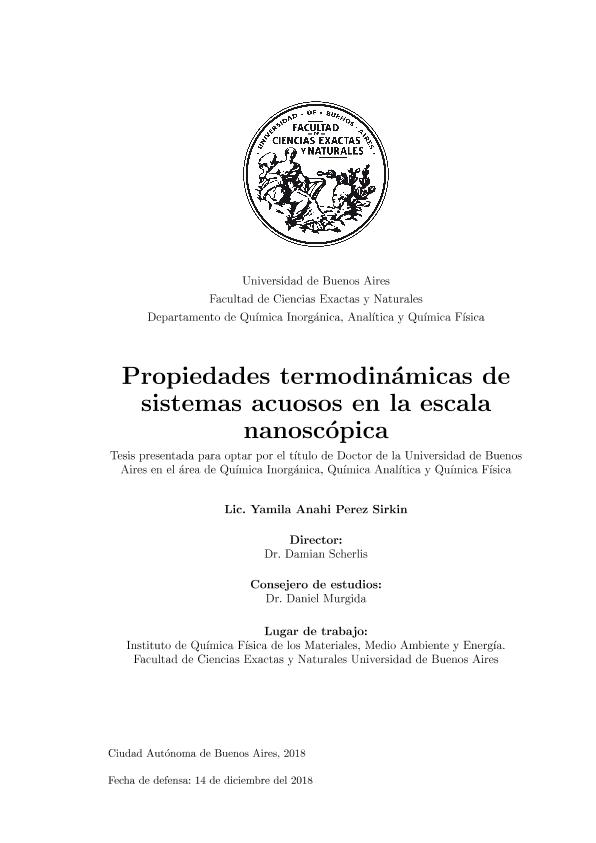Mostrar el registro sencillo del ítem
dc.contributor
Scherlis Perel, Damian Ariel

dc.contributor
Murgida, Daniel Horacio

dc.contributor.author
Pérez Sirkin, Yamila Anahí

dc.date.available
2019-07-23T17:54:32Z
dc.date.issued
2018-12-14
dc.identifier.citation
Pérez Sirkin, Yamila Anahí; Scherlis Perel, Damian Ariel; Murgida, Daniel Horacio; Propiedades termodinámicas de sistemas acuosos en la escala nanoscópica; 14-12-2018
dc.identifier.uri
http://hdl.handle.net/11336/80061
dc.description.abstract
Thermodynamic properties of aqueous systems in nanoscopic scaleIn the present thesis, the thermodynamical properties of aqueous systems in the nanos-cale regime were investigated. In particular, the following phenomena were analyzed: i)the vapor pressure of water-ions systems, from the macroscopic scale to aggregates ofonly a few particles. ii) The nucleation of bubbles on nanoelectrodes. iii) The effect ofconfinement on the water dissociation constant.The GCS (Grand Canonical Screening) methodology, which has been developed in ourgroup before this thesis, allows us to obtain the vapor pressure of systems that havea liquid-vapor interface. In the present thesis, this methodology has been modified inorder to study the vapor pressure of systems without an interface, with the purpose ofapplying it to more complex systems, like fuel cells. The effect of electrolytes on thevapor pressure of water has been studied from both the experimental and theoreticalpoints of view in the case of bulk systems, however the resolution of the experiments fornanoaggregate does not allow a description on the microscopic scale, and is the cause ofone of the greatest uncertainties in atmospheric predictions. In this context, we studythe ability of different models, both atomistic and coarse-grained, to predict the vaporpressure of systems of just a few molecules.The nucleation of nanobubbles on nanoscopic electrodes has been frequently studiedin recent decades, not only for its relevance from a chemical-physics standpoint, whichleaves many open questions regarding the nucleation mechanism and the stability, butalso because of its importance in the design and optimization of electrocatalytic tech-nologies. In this thesis, this phenomenon has been studied through molecular dynamicssimulations with coarse-grained models in collaboration with an experimental group atThe University of Utah.Different authors have speculated on how confinement can affect the autodissociation ofwater, but this question has not yet been answered through experiments, and has beenscarcely addressed from simulations. Recent studies suggest an increase of the dissocia-tion constant in bidimiensional nanometric pores. In the present thesis, this effect hasbeen studied under a more extreme confinement, in particular in a (6,6) carbon nano-tube, where the opposite effect was observed.To study these problems, this thesis has used different classical, quantum, and QM-MMsimulation schemes, including the following open source software: LAMMPS, MCCCS-Towhee and Quantum Espresso. It has often been necessary to implement new featureswithin these programs, as well as different tools for data analysis .
dc.description.abstract
In the present thesis, the thermodynamical properties of aqueous systems in the nanoscale regime were investigated. In particular, the following phenomena were analyzed: i) the vapor pressure of water-ions systems, from the macroscopic scale to aggregates of only a few particles. ii) The nucleation of bubbles on nanoelectrodes. iii) The effect of confinement on the water dissociation constant. The GCS (Grand Canonical Screening) methodology, which has been developed in our group before this thesis, allows us to obtain the vapor pressure of systems that have a liquid-vapor interface. In the present thesis, this methodology has been modified in order to study the vapor pressure of systems without an interface, with the purpose of applying it to more complex systems, like fuel cells. The effect of electrolytes on the vapor pressure of water has been studied from both the experimental and theoretical points of view in the case of bulk systems, however the resolution of the experiments for nanoaggregate does not allow a description on the microscopic scale, and is the cause of one of the greatest uncertainties in atmospheric predictions. In this context, we study the ability of different models, both atomistic and coarse-grained, to predict the vapor pressure of systems of just a few molecules. The nucleation of nanobubbles on nanoscopic electrodes has been frequently studied in recent decades, not only for its relevance from a chemical-physics standpoint, which leaves many open questions regarding the nucleation mechanism and the stability, but also because of its importance in the design and optimization of electrocatalytic technologies. In this thesis, this phenomenon has been studied through molecular dynamics simulations with coarse-grained models in collaboration with an experimental group at The University of Utah. Different authors have speculated on how confinement can affect the autodissociation of water, but this question has not yet been answered through experiments, and has been scarcely addressed from simulations. Recent studies suggest an increase of the dissociation constant in bidimiensional nanometric pores. In the present thesis, this effect has been studied under a more extreme confinement, in particular in a (6,6) carbon nanotube, where the opposite effect was observed. To study these problems, this thesis has used different classical, quantum, and QM-MM simulation schemes, including the following open source software: LAMMPS, MCCCSTowhee and Quantum Espresso. It has often been necessary to implement new features within these programs, as well as different tools for data analysis .
dc.format
application/pdf
dc.language.iso
spa
dc.rights
info:eu-repo/semantics/openAccess
dc.rights.uri
https://creativecommons.org/licenses/by-nc-sa/2.5/ar/
dc.subject
Termodinamica
dc.subject
Agua
dc.subject.classification
Físico-Química, Ciencia de los Polímeros, Electroquímica

dc.subject.classification
Ciencias Químicas

dc.subject.classification
CIENCIAS NATURALES Y EXACTAS

dc.title
Propiedades termodinámicas de sistemas acuosos en la escala nanoscópica
dc.title
Thermodynamic properties of aqueous systems in the nanoscopic scale
dc.type
info:eu-repo/semantics/doctoralThesis
dc.type
info:eu-repo/semantics/publishedVersion
dc.type
info:ar-repo/semantics/tesis doctoral
dc.date.updated
2019-06-26T16:07:47Z
dc.description.fil
Fil: Pérez Sirkin, Yamila Anahí. Consejo Nacional de Investigaciones Científicas y Técnicas. Oficina de Coordinación Administrativa Ciudad Universitaria. Instituto de Química, Física de los Materiales, Medioambiente y Energía. Universidad de Buenos Aires. Facultad de Ciencias Exactas y Naturales. Instituto de Química, Física de los Materiales, Medioambiente y Energía; Argentina
dc.relation.alternativeid
info:eu-repo/semantics/altIdentifier/url/https://digital.bl.fcen.uba.ar/collection/tesis/document/tesis_n6557_PerezSirkin
dc.conicet.grado
Universitario de posgrado/doctorado

dc.conicet.titulo
Doctora en Química Inorgánica, Química Analítica y Química Física
dc.conicet.rol
Autor

dc.conicet.rol
Director

dc.conicet.rol
Consejero de estudios

dc.conicet.otorgante
Universidad de Buenos Aires. Facultad de Ciencias Exactas y Naturales. Departamento de Química Inorgánica, Analítica y Química Física

Archivos asociados
